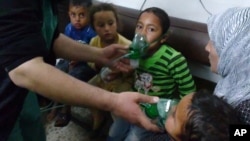The suffering experienced by victims of chemical weapons – the choking, burning, and suffocating, as well as the indiscriminate nature of the killing by gases that seep into the air and allow for no escape -- led the international community to ban their use after World War I, and to reinforce this ban in 1972 and 1993.
Tragically, the ban has not stopped the use of chemical weapons by certain actors, even within the past five years. The Organization for the Prohibition of Chemical Weapons–United Nations Joint Investigative Mechanism, known as the JIM, was established by the UN Security Council to investigate incidents of chemical weapon attacks in Syria. It determined that ISIS employed mustard gas in Syria in 2015, and that the Syrian regime used chemical weapons in three separate incidents in 2014 and 2015.
On February 28, the Security Council voted on a draft resolution that would hold those using and producing chemical weapons in Syria accountable. It would impose sanctions on individuals and entities linked to the use of chemical weapons in cases where responsibility was established by the JIM.
Although a majority of the Security Council’s 15 members voted in favor of the resolution, it was not adopted after permanent Council members Russia and China voted against it.
U.S. Permanent Representative to the UN Ambassador Nikki Haley called Russia and China’s choice to block the resolution to hold the Syrian regime accountable for its use of chemical weapons, “outrageous and indefensible.”
She noted the JIM spent a year collecting evidence, speaking to witnesses, and verifying testimony. The conclusion that the Assad regime used chemical weapons three times from 2014 to 2015 and ISIS used them once, “remains irrefutably clear,” Haley said, adding that there are also “credible reports that Assad used chemical weapons many, many more times.”
“Amazingly members are willing to condemn ISIS for the one incident, but turn a blind eye to the Member State, Syria, who committed this crime at least three times.”
Russia and China, Ambassador Haley said, “put their friends in the Assad regime ahead of our global security...It is a sad day on the Security Council. When members start making excuses for other Member States killing their own people, the world is definitely a more dangerous place.”












